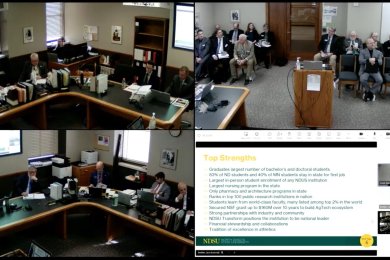Several NDSU transportation and logistics graduate programs recently were designated as STEM (science, technology, engineering and mathematics) programs, signaling to potential students and employers that graduates will be skilled in the latest technology and data science in their field.
“Employers demand strong technical proficiencies in these fields,” said Tim Peterson, chair of NDSU’s Department of Transportation, Logistics and Finance. “The STEM designation indicates to employers that our graduates have the ability to use the appropriate tools and analyze large amounts of data in ways that enhance the transportation and logistics functions of their companies or agencies.”
The programs received the STEM designation from the North Dakota University System June 3 in recognition that they had achieved the required high level of instruction in the STEM disciplines. The designation applies to the Master of Supply Chain Management, Master of Transportation and Urban Systems and the doctorate in Transportation and Logistics. The Master of Business Analytics is the other STEM-designated program offered by NDSU’s College of Business.
The Master of Supply Chain Management has much in common with a management science degree and includes foundational courses in inventory theory, forecasting, aggregate planning and project management. Mathematical and statistical techniques include linear programming, process flow analysis, and simulation. Students also learn Enterprise Resource Planning, which involves resource forecasting and operations research techniques for strategic capacity planning to organizational problems and performance.
“Students develop supply chain management skills and gain a capacity to apply them in real-world situations,” Peterson said. The degree is offered entirely online to aspiring logisticians, industry professionals, military officers and others. Career opportunities exist in logistics and supply chain management, operations management, purchasing and demand management, emergency management, consulting, agriculture, retail businesses and other sectors.
The Master in Transportation and Urban Systems is an online program aimed at industry professionals. Courses cover the design, planning and operation of transportation systems for the physical movement of people and materials. Students learn to use system analysis tools in urban transportation modeling, including transportation plan evaluations, traffic forecasting, system capacity analysis, simulation analysis and benefit-cost analysis. Students also study the impacts of transportation system design and management, including the relationships between land use and transportation and the related impacts to the economy, environment and society.
“The Master of Transportation and Urban Systems is, by design, a STEM program,” said Diomo Motuba, assistant professor of transportation and logistics. “The STEM designation enhances the competitiveness of this program because the students it is designed for are planners and engineers. The technology tools used in the classes provide the students with exposure to tools that employers seek and puts the students at an advantage in the jobs field by reducing their learning curves.”
The doctorate in transportation and logistics involves significant elements of advanced mathematics, engineering, statistics and analysis, according to Raj Bridgelall, assistant professor of transportation and logistics. This work helps students develop skills in optimizing investments, safety and routing. A course on intelligent transportation provides background in vehicle automation, electrification, communications and cloud computing. Other courses cover data mining and analysis of “big data,” vast volumes of data collected from sensors and connected vehicles. Students also learn travel demand modeling, cybersecurity and artificial intelligence.
“All of the courses in transportation science and technology are interdisciplinary. They focus on applied science and research to solve real-world applications in transportation and logistics,” Bridgelall said. “The need for STEM graduates will increase as transportation systems and planning continuously integrate more technology and become more advanced.”
As a student-focused, land-grant, research university, we serve our citizens.




